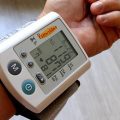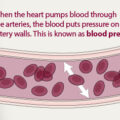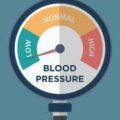High blood pressure (hypertension) is a common condition in which the long-term force of the blood against your artery walls is high enough that it may eventually cause health problems, such as heart disease.
Blood pressure is determined both by the amount of blood your heart pumps and the amount of resistance to blood flow in your arteries. The more blood your heart pumps and the narrower your arteries, the higher your blood pressure. A blood pressure reading is given in millimeters of mercury (mm Hg). It has two numbers.
- The top number (systolic pressure). The first, or upper number measures the pressure in your arteries when your heart beats.
- The bottom number (diastolic pressure). The second, or lower number measures the pressure in your arteries between beats.
You can have high blood pressure for years without any symptoms. Uncontrolled high blood pressure increases your risk of serious health problems, including heart attack and stroke. Fortunately, high blood pressure can be easily detected. And once you know you have high blood pressure, you can work with your doctor to control it.
There are different high blood pressure medications (antihypertensives) available, each with pros and cons. Your doctor might prescribe more than one type to treat your condition. If you have high blood pressure or are at risk of developing it, lifestyle changes can help keep your numbers under control. But you might need medication too.
Taking your medications as prescribed, monitoring your blood pressure, and making lifestyle changes can help you reach and maintain healthy blood pressure.
What Blood Pressure Pills Cause Cancer?
A category of blood pressure medicine can increase your risk of developing some types of cancer. According to a new Canadian study, people who take those drugs can increase their sensitivity to the sun’s harmful ultraviolet (UV) rays. The researchers reviewed data for nearly 303,000 adults in Ontario over 65 who were prescribed medications for high blood pressure. The study then compared their skin cancer histories with those of more than 605,000 adults who weren’t taking antihypertensive drugs.
The findings showed that certain types of high blood pressure drugs known as thiazide diuretics were associated with higher rates of keratinocyte skin cancers, including basal cell carcinoma, squamous cell carcinoma, advanced keratinocyte carcinoma, and melanoma.
Examples of oral thiazide diuretics include:
- Chlorothiazide (Diuril)
- Chlorthalidone
- Hydrochlorothiazide (Microzide)
- Indapamide
- Metolazone
If you’re diagnosed with high blood pressure, you should monitor your blood pressure regularly. Beyond choosing the right type of medication, you should keep a close tab on your numbers to alert you to any changes and help you detect patterns. Tracking your results over time will also reveal if the changes you’ve made are working.
Make changes that matter:
- Eat a well-balanced diet that’s low in salt
- Limit alcohol
- Enjoy regular physical activity
- Manage stress
- Maintain a healthy weight
- Quit smoking
- Take your medications properly
- Work together with your doctor





